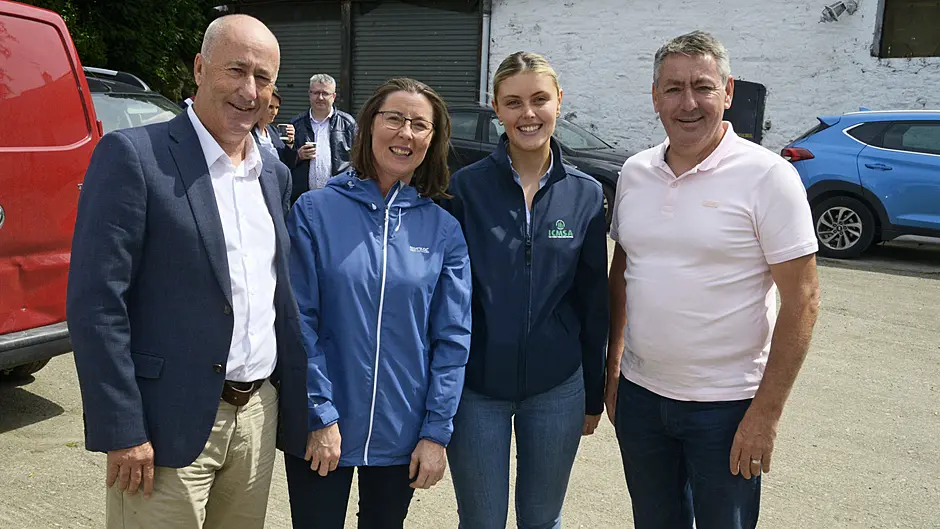BY EMMA CONNOLLY
UNLESS water quality improves in the next two years, Ireland could be facing a similar fate as the Netherlands, which is in the middle of a four-year wind down of its derogation.
That’s according to Eddie Burgess, agriculture and catchment specialist with Teagasc, who was speaking ahead of a visit by county mayor Frank O’Flynn to the Timoleague catchment area last Thursday.
The Irish Agricultural Catchment Programme (ACP) conducted by Teagasc has been monitoring water quality in six locations across Ireland, including Timoleague, since 2009, to evaluate the measures that farmers are asked to undertake for its nitrates derogation.
‘The trick is in the name, it’s a derogation, there’s no entitlement to it, it’s basically a relaxation of the rules,’ said Eddie.
‘Flanders lost it last year; in two-and-a-half years, Netherlands won’t have it and Denmark will be nervous ahead of its next review,’ he said.
Ireland’s last review was two years ago and while we kept our 250 derogation, written into it was that after two years there would be a review of water quality not just in the six catchments, but in the EPA’s 5,000 monitoring sites.
Those results show Ireland isn’t moving towards the standard required in Europe’s water framework directive, and from January it’s feared, but not confirmed, that the derogation will drop from 250 to 220, and the European Commission will make its final decision in two years’ time.
Losing it would bring everyone down to a limit of 170kg N/ha/year. With approximately 13,000 farmers nationally currently above this limit, it’s an issue of huge concern reflected by the huge crowd which supported a recent IFA ‘save our derogation’ rally in Bandon to voice their fears.
‘For example, in the Timoleague catchment, there are 18 dairy farms, and 2,500 cows. At the 220 limit, it will mean an approximate 20% cut in cow numbers, and at 170 that would mean a 40% cut in cow numbers,’ said Eddie.
‘That will mean a huge loss in personal income and an economic loss to a community,’ said Eddie.
The consequences of this are already being felt with the increase in land prices both for sale and rental which works against farming enterprises not as profitable as dairy, he said.
‘Tillage is reducing and this is driving a wedge between different agricultural sectors,’ he said.
In his role, he regularly travels to the different catchment areas, and he pointed to the differences between Clonakilty, and Ballinrobe, Co Mayo.
‘When I’m in Clonakilty I see a busy town, no ‘for sale’ signs and thriving businesses. When I go to Ballinrobe, I see dereliction in the centre of the town, lots of ‘for sale’ signs. ‘There’s something amiss there that’s not in Clonakilty, and while it’s just my opinion and I have no scientific evidence, I put that down to West Cork’s dairy industry,’ he said.
Water quality is a hugely complex area, he said, and nitrates loss is only one aspect. However, he points out that results from the catchment programme in Timoleague clearly state that the role stocking rate has on water quality, is overridden by weather and soil quality.
‘That’s what disappoints me. The objective is that farmers are asked to do things that make sense, but removing the derogation won’t impact water quality. I have alternative suggestions which farmers may not like, including limiting the stocking rate on the grazing platform to reduce urine patches from dairy cows,’ he said.
He said the Department of Agriculture is hearing that message, so is the Department of Housing which signs off on the directive, but frustratingly, Brussels isn’t.
‘From my meetings with the Department of Agriculture I know that the European Commission is being very difficult to deal with and unless we see water quality improving in two years’ time the next decision Ireland could be facing will be similar to the Netherlands which was given a four-year wind down and in two-and-a-half years’ time, won’t have it.
‘If I was a dairy farmer I’d be stress-testing for stocking rate limits of 170. There are strong indications that that’s what the future will look like from 2030,’ he said.
County mayor Frank O’Flynn said that coming from a farming background, he was keen to see first-hand the work being done in the Timoleague catchment.
‘I grew up on a farm, studied dairy food science and worked in Dairygold so I feel very much part of the agriculture community,’ he said. I know the pressures farmers are under now, and it’s essential that we hold the 220 derogation,’ he said.










